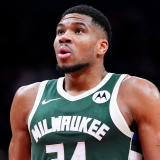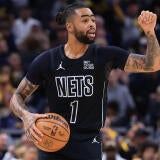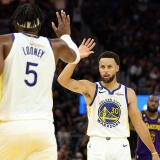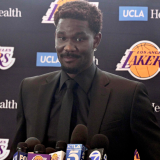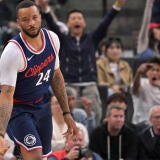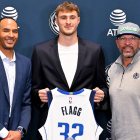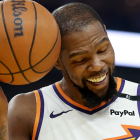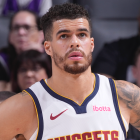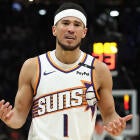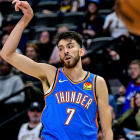Pacers vs. Knicks: Why Aaron Nesmith's sprained ankle is far more important than you may realize
Nesmith, who is expected to play in Tuesday night's Game 4, is vital to the Pacers
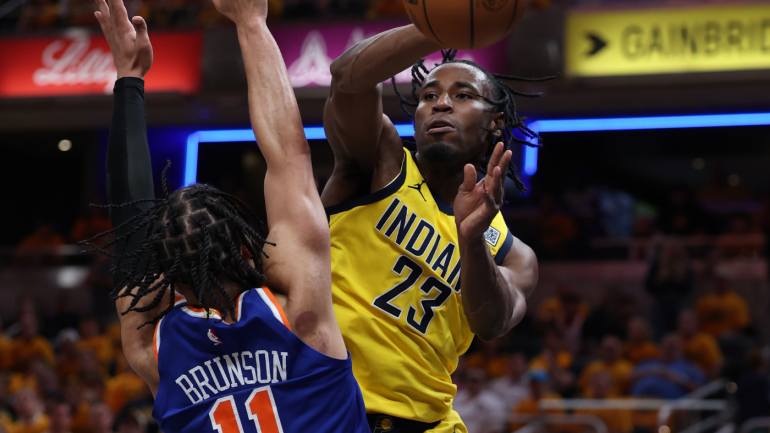
Ankle sprains are tricky injuries. It's not a torn ACL. They're fairly common in the NBA, and they are excruciatingly painful when they happen, but the adrenaline kicks in quickly. It certainly did for Aaron Nesmith on Sunday, when he returned to Game 3 of the Eastern Conference finals despite suffering a third-quarter sprain to his right ankle. He mostly looked like himself, moving well as the Pacers attempted to take a 3-0 lead in the series.
But he was walking with a noticeable limp after the game, according to ESPN. Despite playing at the end of Game 3, he is now listed as questionable for Game 4. Once the adrenaline wears off and the swelling sets in, moving on a sprained ankle can get even harder in the days that follow. Nesmith is expected to play Tuesday night, but there's a good chance that he's limited.
And if he is? That's a pretty significant loss to the Pacers on a number of levels. The most obvious comes on defense. Nesmith is probably Indiana's best answer for Jalen Brunson. He held him to 27-of-60 shooting in last year's series whereas Indiana's other frequent Brunson defender, Andrew Nembhard, got torched on 26-of-39 shooting. Those numbers have been closer this time around, but with the important caveat that Brunson has seven turnovers to only six assists against Nesmith.
Nembhard is a stellar guard defender. He's just too small for Brunson, especially after playing back-to-back rounds against Ausar Thompson and Jrue Holiday, two extremely physical perimeter defenders with size advantages over him. Nesmith is bigger and bulkier. That doesn't make him a perfect Brunson defender. It does make it easier for him to force Brunson to work for his points.
An ankle injury is less than ideal in Brunson's presence considering how much stopping and starting he does. Brunson is among the NBA's most dangerous decelerators. He's going to use spin moves to generate space in this matchup and force Nesmith to launch off of that injured ankle to contest his jumpers. If he can't? Well, Brunson is about as dangerous as any scorer mid-range scorer in basketball. He's going to get a lot of points.
The Pacers score plenty themselves. Nesmith's shooting is an important element of that Indiana offense. The Pacers are scoring 14.4 more points per 100 possessions this postseason with him on the floor this postseason than without him. Obviously, that is in part because he has been tied to Tyrese Haliburton, but for what it's worth, Haliburton hasn't quite been Haliburton without Nesmith this season.
Nesmith suffered another ankle injury earlier this season, though it was on his left foot. He missed 35 games as a result. Indiana's midseason return to form coincided pretty closely with his return: the Pacers were 22-19 when he came back and finished the season on a 28-13 run. Was some of that due to Haliburton himself seeming healthier and healthier as the year progressed following last year's hamstring issues? Absolutely. But the Pacers scored a blistering 125.5 points per 100 possessions with Haliburton and Nesmith on the floor together in the regular season, according to Cleaning the Glass. When Haliburton played without Nesmith, that figure fell to 116.8. It turns out, having a shooter who has reliably hit above 40% of his 3s for the past two seasons is pretty important for a playmaking guard.
It isn't just important for Haliburton. Health matters for any team, but depth is central to Indiana's identity. The Pacers want to wear opponents down with pace. That's why they run 10-man rotations deep into the playoffs. They need to keep their own players fresh while they try to exhaust their opponents across seven games. The Knicks are theoretically susceptible to that approach given how heavily reliant they are on their best players, though in fairness, Tom Thibodeau going deeper onto his own bench on Sunday might have swung Game 3.
An absent or limited Nesmith makes that substantially harder. The Pacers are deep, but not in ways that are immediately helpful where a Nesmith injury is concerned. The player who would theoretically stand to step in and play a bigger wing role if needed would be Bennedict Mathurin, but he's been dreadful in this series. The Pacers have lost his 40 minutes in this series by 31 points and he's shot just 2-of-8 from the floor.
If the Pacers were missing a shot-creator, T.J. McConnell could scale up. If, say, Pascal Siakam was out, Obi Toppin could probably step into more minutes. But there's not an obvious replacement for what Nesmith gives this team. Ben Sheppard is playable, but not overtly helpful unless his own shots are falling. They have in this series, but he shot only 6-of-17 from deep against Milwaukee and Cleveland. Fine for a reserve. Less for a Nesmith replacement.
Depth is, generally, one of Indiana's greatest strengths. There has never been a team in NBA history that is equipped to handle any injury that could befall this roster. Nesmith may not be a star, but he was a quietly critical component of Indiana's success all season even before his Game 1 explosion swung the series opener for the Pacers. If he's not himself, the Pacers aren't themselves. And as anyone who has suffered a sprained ankle will tell you, it's really hard to be yourself physically two days after suffering a bad one.
![[object Object] Logo](https://sportshub.cbsistatic.com/i/2020/04/22/e9ceb731-8b3f-4c60-98fe-090ab66a2997/screen-shot-2020-04-22-at-11-04-56-am.png)


